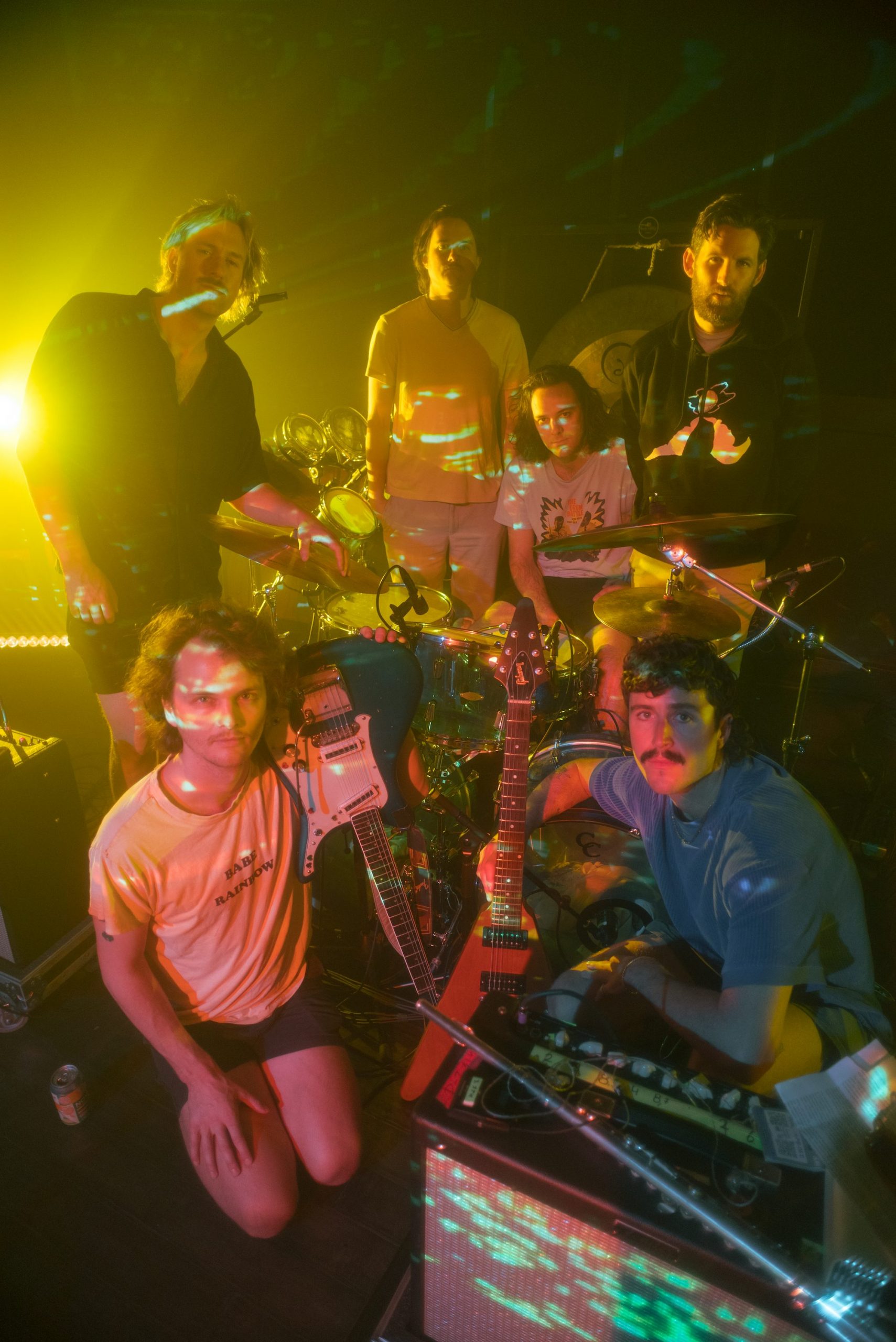For a singer like a force of nature, 'Premonitions' is a changing of seasons.
The first thing you'll notice about Miya Folick is that voice. She's just one of these people: There's a natural gift there, and she has cultivated it, and she knows how to deploy it. Her vocals have an overwhelming power when she truly lets loose, the sound of a storm brewing within then erupting from a human body. She has channeled righteous anger, she has channeled hurt, she has channeled wistfulness; she has covered Joni fucking Mitchell and succeeded. We get new, exciting songwriters all the time. But performers like Folick are more uncommon. Sometimes you hear someone, and you immediately know they are elemental.
Folick has been kicking around as a musician for a couple years now. Back in the spring of 2015, she released her debut EP Strange Darling. She followed that last November with a second EP titled Give It To Me. There were little articles here and there in between, but it was with the latter release where she truly started to garner some buzz.
That EP's title track came with a memorable rollercoaster-set video that made it linger, but the music itself was, naturally, the selling point. Simmering, then roiling, then volcanic, "Give It To Me" was a showcase for Folick's talent and personality visceral enough to ensure that the uninitiated would take notice. It was the kind of performance and composition that instantly and irrevocably demanded your attention, demanded your acknowledgment that an important new artist was about to arrive.
It is just under a year later. Now, she is finally unveiling her full-length debut Premonitions, out today. And the question is: We know she has a voice, but what will she use it for?
One October afternoon, her first album right around the corner, I meet with Folick at her Los Angeles apartment. She lives in a sprawling, loft-style space, with all sorts of odds and ends spread throughout -- multiple couches, random trinkets and antique-looking furniture, an old chair from a plastic surgery office placed in the middle of the room fooling you into thinking it's some kind of massage chair. "I've just been accumulating crap," Folick tells me with a weary laugh, noting how she's lived here for half a decade and yet is sometimes just passing through thanks to the life of a touring musician. "At some point I want to actually make this feel like mine. A lot of it is just shit people give me." It looks like the quintessential artist's abode, detritus of an inquisitive spirit spread throughout.
Anyone who's seen the videos for "Give It To Me" or "Deadbody" would be prepared for Folick to be an intimidating figure in person. And you can certainly notice an intensity lingering underneath, burning deep within her gaze and waiting to escape and consume everyone around her. She also speaks with the controlled poise of someone who's had years of both traditional music lessons and acting training. But at the same time, she's quick to slide into bursts of surprised, sometimes self-deprecating laughter. On Premonitions, you can hear those different sides of Folick, plus a couple more.
Folick's path towards the music world was circuitous. She has always been a singer; she studied classical voice when she was younger. But she wasn't always setting out to be a musician, exactly. After attending NYU and USC -- two years each around the turn of the decade -- her initial ambition was to be an actress. While she loves acting, she was turned off by various mechanisms and realities of that end of show business. "I thought [songwriting] was really fun, I spent a lot of my energy and attention on that," she explains. "Then I'd go to an audition that I barely prepared for. I think I realized, why am I doing this thing I clearly don't care about or really want to do."

As she grew more serious about music, she found herself outside that world, looking in. Not knowing any musicians around LA, she took the unlikely route of starting a Tinder profile for the exclusive purpose of recruiting a band. (This will come as a shock to no one, but there are a lot of musicians on Tinder.) This was several years ago, and Folick waited until she found her footing in the music industry before making any significant decisions about who she wanted to work with, how she wanted to go about this.
After the two EPs -- Strange Darling being more acoustic and melancholic, Give It To Me louder and fuzzier -- Folick was figuring out how to make the album she heard in her head. While it took her a while to find a production partner she clicked with, everything locked in when she met Justin Raisen, who's made his name in recent years with writing and/or production credits for artists like Sky Ferreira, Charli XCX, Angel Olsen, and Yves Tumor. "I felt like working with him, I found somebody who was as creatively free as I am," Folick says. "He's able to work in a lot of different genres and sounds and what I was looking for on this album was to make an album like Björk's Post, that encompasses all the different sonic palettes of this time. He was down for that."
If you came across Folick by way of Give It To Me last year, Premonitions might be surprising. "Deadbody," which turned out to be the first preview of the album, initially suggested an extension of its predecessor's '90s alt-rock leanings -- a scathing and churning track, it had the same weight and fury of Folick's work last year. The next single, "Stock Image," clued us into what Premonitions was actually like: a shape-shifting pop album dominated by synthesizers and beats.
At first it's tempting to wonder if new writing partners bring an artist into a totally different lane. And Raisen did encourage Folick to explore different territory. "[Raisen] asks good questions," Folick says of their working relationship. "He's emotional and passionate and has this ability to push you in certain ways." But she's also quick to note that, though she knew listeners would be surprised by the direction of the full-length, that is where she always intended to take the project.
Though Folick listens to a lot of guitar-oriented music, the aesthetic of Give It To Me was almost born out of necessity: It was more "immediate" to make music that way, and it gave her a more dynamic live show. But at home, she's always writing with the sounds she's most attracted to, synthesizers alternately gleaming and huge and dreamy and spectral. With Premonitions, she had the right resources to fully realize that. "It felt like I was finally making the album I always wanted to make," she explains.
She and Raisen built the album up through writing sessions, including one 10-day stint in which they composed a song a day. Folick prefers to enter those situations with a blank slate; she doesn't consider herself to be a "songwriter," per se. "It honestly feels more like I'm reaching in the dark for something that feels right rather than trying to say a specific thing," she explains. "It's more like it's coming to me, than I'm doing it. I feel like I create it, or sing it, but I never write anything down."

At the same time, the long build-up to Premonitions and the growing pile of life experiences that informed it meant that Folick had a clear of idea of what the album should be. "I knew I wanted to make something that had a broader spectrum than the EPs, which I think feel very intimate and are about personal relationships," she says. "[Premonitions] is about me and my relationships, but it looks outward a little bit more."
The name Premonitions came about in a curious way. While in the studio, Raisen, Folick, and their other collaborators made daily use of Oblique Strategies, the cards created by Brian Eno and Peter Schmidt in the '70s to encourage creativity with random thoughts or goals or koans. One day, Folick pulled a card reading "Cut a vital connection." At the time, she was in a relationship with a person across the world, in Berlin, and she was feeling the strain. "This person ... had this very idealized version of who I was," she explains, appearing to mull over and select her words precisely. "I wanted to be challenged and seen as a dynamic, flawed person."
That was the basis of what would become Premonitions' title track, with Folick singing "Don't make it easy on me/ Don't let me slide" in the chorus. That also happened to be the song they were working on when she pulled that card. She tried to brush it away, but she couldn't shake the realization that she had to end the relationship. Months later, when it was over, she and Raisen looked back on that day and regarded it as a premonition that defined the scope of the album.
"When we were thinking about titles for the album, I wanted something classic," she explains. She wanted one word, a capacious yet evocative title akin to "something Fleetwood Mac would name their album." Something that sounded classic. Perhaps more importantly, Premonitions got at the "time-warp" Folick hears on the album, past influencing the future, imagined and real directions a person's life can take. There's a sense, across this collection of songs, of time passing.
Part of that came from the simple fact that, when making the album, Folick and her accomplices were not sequestered someplace far away, isolated from life. Rather, they were home, right in the middle of all kinds of events ranging from Folick's breakup to Raisen expecting a child. They kept referring to Premonitions as "domestic pop." "Pop about getting coffee, pop about dancing in the living room," Folick says. Small moments made grandiose and dramatic, big changes rendered with more elusive sounds.
Their surroundings played a role, too. From Folick's window, she has an unobscured view of the LA skyline, and her working process involved a lot of long walks around town. It left its mark. "This place is etched into the process," she says. "There's something very LA about this album to me." Altogether, it made Premonitions an album that feels like the culmination of a young person's life to this point, perhaps as a strong debut should.
Capturing the twists and turns of a person's 20s is part of what gave Premonitions its diverse array of moods and sounds. There is a self-affirming and skyward synth-pop at play in "Stock Image," next to more straight-up pop in the horn-assisted "Leave The Party," the ironically fast-talking "Stop Talking," or the born-to-be-a-singalong "Freak Out." That stretch of tracks abruptly drops you right into the darkness and vengeance of "Deadbody."
Bracketing either side of the album are spacier or more meditative tracks. "Thingamajig" is about "this feeling you can't quite remember the name of," and that's a good way to describe a lot of Premonitions' early and later tracks -- utilizing melodic cues from dream-pop, the songs conjure longing as they try to process different chapters beginning and ending. One of these in particular stands out, the show-stealing penultimate track "Baby Girl."
It's one of the songs on Premonitions that is less direct, open to interpretation. You could read certain lines as Folick singing to herself, to a dear friend, to a former lover. "Lying on the bathroom floor/ Laughing our heads off/ Crying in the alleyway/ Your head in my arms," she sings at one point, rendering these tiny personal moments in almost mythic stature thanks to the beauty and impact of the melody.
"There's something very nostalgic about the production, but the vocal production and melodies feel more futuristic," Folick says of the song. "It kind of has that Cocteau Twins feel, but they would've washed the vocal out. We kept it dry and raw. That song feels like a hug."

"Baby Girl" is one of the more impressive performances on Premonitions, the way Folick transitions from restraint to those soaring chorus melodies, choosing notes that make it unclear whether these memories are happy or sad. But people will latch onto all kinds of different moments on the album according to their predilections; Folick is a powerhouse presence throughout. There are others where she grasps at that otherworldly quality of "Baby Girl," then she bellows in "Deadbody," grows more conversational in the mid-album pop tracks, lets endorphins and catharsis flow freely on "Stock Image." She's really embracing the idea of her voice as an instrument, and with it she paints all the different emotions and events that birthed Premonitions, that mingling of past and future.
As for the latter: Folick will be touring behind Premonitions next year, but there are also other possibilities she'll consider around the bend. Just before releasing her own album, Folick also appeared in a crucial spot on Fucked Up's warped, psychedelic opus Dose Your Dreams, taking lead on the album's epic closer "Joy Stops Time." The guest spot came about through mutual connections, and the band sent Folick a rough version of the track and "a guide of how it should be done but a lot of freedom." Over the course of an hour in a "tiny-ass studio in Echo Park," she tried out a few different approaches to the song. Perhaps unsurprisingly given Fucked Up's approach to Dose Your Dreams, they just put them all on: What you hear on "Joy Stops Time" is multiple Folicks, singing the song several different ways at the exact same time.
Thanks to that positive experience and Folick's affinity for singing, she's open to doing more feature work in the future. Similarly, she's newly open to acting again but getting re-acclimated to the requirements of that world, the demands of projects that involve so many different cooks. Years ago, Folick abandoned acting for a few very specific and justifiable reasons. She rejected the notion that she had to take on bad projects to "pay dues." That wasn't how she wanted to spend her 20s.
There was also a trickiness with casting. "I look a little different," she explains. "I didn't fit into any family. I'm too severe to be the girl next door, but I'm too soft to be the comic book character. I'm half-Japanese, I'd be cast as the Other." She thinks things are changing and that won't matter as much today; she envisions a year spent touring, then maybe looking for a small indie film or a recurring TV gig she could do alongside recording another album.
Folick wants to let Premonitions out into the world, let it breathe and see what happens. But she is already writing that second album. Who knows when that will arrive, or where we'll hear her next, or whether she'll appear on a screen rather than a stage this time next year. There were decisions and left turns that eventually led to Premonitions, that had to be bottled up and released within those songs. And there may yet be decisions and left turns that produce something else entirely next. But one thing we know about Folick: As restless and open as she wants to be as an artist, that voice can move in any direction it wishes.







